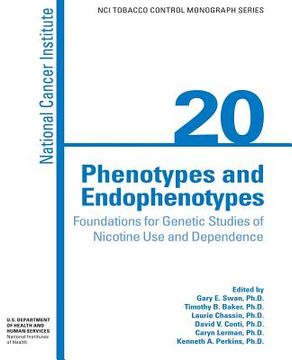Share
Phenotypes and Endophenotypes: Foundations for Genetic Studies of Nicotine Use and Dependence (in English)
U. S. Department of Heal Human Services
(Author)
·
National Institues of Health
(Author)
·
Ph. D. Gary E. Swan
(Illustrated by)
·
Createspace Independent Publishing Platform
· Paperback
Phenotypes and Endophenotypes: Foundations for Genetic Studies of Nicotine Use and Dependence (in English) - Human Services, U. S. Department of Heal ; Health, National Institues of ; Swan, Ph. D. Gary E.
$ 27.19
$ 33.99
You save: $ 6.80
Choose the list to add your product or create one New List
✓ Product added successfully to the Wishlist.
Go to My WishlistsIt will be shipped from our warehouse between
Monday, July 01 and
Tuesday, July 02.
You will receive it anywhere in United States between 1 and 3 business days after shipment.
Synopsis "Phenotypes and Endophenotypes: Foundations for Genetic Studies of Nicotine Use and Dependence (in English)"
The National Institutes of Health Publication 09-6366, Phenotypes and Endophenotypes: Foundations for Genetic Studies of Nicotine Use and Dependence, NCI Tobacco Control Monograph 20, (the twentieth volume of the Tobacco Control Monograph series of the National Cancer Institute) reviews the scientific foundation for genetic studies of nicotine use and dependence. The authors and editors perform an admirable job synthesizing the expanding literature in the field and developing a scientific blueprint for the integration of genetic approaches into transdisciplinary studies of nicotine dependence. This seminal work should be examined in the context of global public health action on tobacco prevention and control as well as advances in genomics and related technologies. It is important to ask how genetic studies of nicotine use and dependence can contribute to the overall public health effort in tobacco control and prevention. For, despite public health efforts, an estimated 45 million people in the United States still smoke. Globally, one billion individuals smoke tobacco on a regular basis, and millions of individuals die yearly from illnesses related to tobacco. A "one size fits all" public health approach has not been fully successful. All available tools will be needed to meet the demand for effective and sustainable tobacco control, including pharmacogenetic-informed treatments and social policy interventions for smoking cessation. Clearly, tobacco use in a population is the product of the interaction of agent, genetic, and environmental factors. Government policies are important modifiable environmental influences that can alter how tobacco products are designed and marketed and how consumers respond. Understanding individual variation in responses to tobacco can help our approach to different programs, policies, and treatments for nicotine dependence. Synergy occurs when tobacco control and prevention interventions directed at agent, host, and environmental factors are implemented together. However, no studies have adequately addressed simultaneously genetic variation, quantitative measures of behavioral, social and cultural variation, and the interaction among these sources of variation. This gap reflects the disciplinary silos that were not uncommon in the 20th century scientific enterprise.

